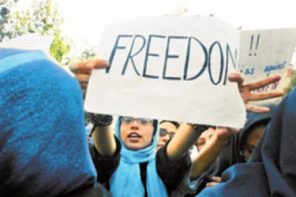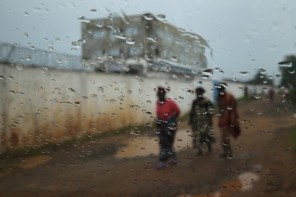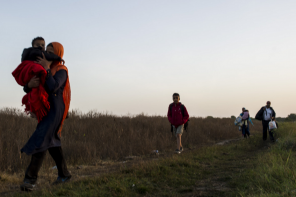There’s been a bevy of people with opinions on Lara Logan’s unfortunate trauma in Egypt. In case you’ve missed it, the chief foreign correspondent for CBS, was sexually assaulted in Cairo while reporting on the uprisings there.
A lot of the response I’ve seen has been pretty mindless. There’s Nir Rosen, of course, and his dumbfoundingly stupid tweets (and bizarrely self-aggrandizing apology therefor). There’s the chorus of believers that good-looking women should expect to be raped, especially when they’re anywhere near… Muslims. I’m not going to link to that crap; if you haven’t already seen it, it’s just a Google away.
There’s also an incredible amount of confusion — of rape with sexual desire, of piety with invincibility, of work hazards with the having of a vagina. One commenter on a blog I frequent said that Logan “accepted that risk” of working in chaos. “If we want to jump the fence to get closer to the lion in the zoo, we accept risk. If we drive too fast on icy roads we accept risk.” Hmmmm…. if only there were a way to measure and quantify that insight… “Good morning, this is your Drive at Five. The chance of rape today is 35 percent, so put on your head-scarves and be careful on that morning commute!”
On second thought, maybe rape isn’t like slipping in wintery weather.
All of that blabber is about one thing: the confusion of rape with irresponsibility. If you hadn’t worn those tight jeans. If you had just covered up your legs/hair/pretty pretty face. If you hadn’t been so dumb as to think you could do your work and be pretty at the same time. For the love of God, if only you hadn’t jumped that fence!
Here’s what else bothers me about this: How many Egyptian women were also harassed, groped or worse? To whom would they report the behavior, when security forces are beating on men and women with access to global television airwaves? What else are we missing while we declare that getting raped is like slipping on ice in a New England winter, or ponder how much being a natural blonde ratchets up your risk?
Since there are about 12,000 people putting their two cents into this debate every hour, I won’t add any more. But I do want to highlight three things you should read if you think that this issue itself, and not how attractive Lara Logan is or how active her love life is (I’m looking at you, NYPost, and not with come-hither eyes), is imporant:
Judith Matloff, an experienced conflict journalist, wrote a piece in the Columbia Journalism Review four years ago on sexual assault and foreign correspondence. Among the many other interesting points she makes is that sexaul assault is far more prevalent than we think, but women don’t report it, largely because they don’t want it to undermine their careers in a macho industry where staying tough to get the story is the only way to survive professionally (whatever it does to you personally).
Kim Barker, a former Chicago Tribune bureau chief in South Asia and past Edward R. Murrow Fellow of the Council on Foreign Relations, wonders if the fallout of all this coverage is that editors — who are mostly men — decide, even unconsciously, not to send women to war zones. That would be the wrong choice, she says, because women can do the work, as so many courageous women have shown us in Iraq and Afghanistan — and so many other places before that.
It would also be wrong for another reason. Barker writes, “More important, they also do a pretty good job of covering what it’s like to live in a war, not just die in one. Without female correspondents in war zones, the experiences of women there may be only a rumor.”
And Amanda Taub at Wronging Rights helpfully points out that the word “risk” in this conversation is loaded almost to the point of disutility:
If women never went anywhere where we risked being sexually assaulted, we’d never go anywhere, period. We certainly couldn’t go to work on foreign aid projects. Or to U.S. military academies. Not to college. Not on dates. Not to parties. Not to bars. Or on cruises. Not to work as models. Or security contractors. Except that even if we never went any of those places, we’d still be screwed (pun intended) because of course a high percentage of rapes happen in the home, committed by perpetrators whom the victims know. Putting the responsibility on women to prevent sexual assault by restricting their own behavior – or on their employers to limit it for them – won’t actually solve the problem, it will just reinforce gendered norms about what “good” women “should” do.




Great post and well-said! All the nonsense in the past days just made me so angry.
Thanks, Melanie.
Amen. I found it soo frustrating reading the comments and reports out there that were blaming Lara, her news team for “sending” her into danger, and loads of other bull that was entirely victim-blaming. It saddened me to see people come to the conclusion that women journalists should basically just stay out of war zones and leave the reporting to the men, because it was too “risky”. I also was left wondering how many Egyptian women were raped or assaulted during the time that we DIDN’T read about.
Loving both this and Amanda’s post!
Thanks, Rebecca. And yeah, Amanda’s generally tops.
I read Judith Matloff’s article for my own post on this subject and was saddened and unsurprised to find that sexual assault is underreported for fear of professional repercussions. Thank you for highlighting the many, difficult folds of this issue. I am angered by many of the reactions to Lara Logan’s assault, particularly the “she had it coming” ones, and am relieved to read your perspective.
Rape is an evil crime. Period.
Whose fault is it? The rapist’s.
Are there things that a woman can do to reduce the chances of being raped? Yes, as with most crimes, but women should no more surrender to the threat of rape than Western society should surrender to Islamic terrorists by changing our way of life.
Are attractive women more likely to be raped? I have no idea. Is Lara Logan an attractive woman? Yes. Did that increase her chances of being promoted into a her current role? Very possibly, but for most people that can only be an assumption, not a known fact. Does that mean people may make snide remarks about her career progression? Unfortunately, yes.
If she wasn’t so attractive might Ms Logan not have been promoted to her current position, and therefore not posted to Tahrir Square? That is a not completely unreasonable hypothesis. But I fail to see how it relates to the motivations of the depraved mob who sexually assaulted her.
It therefore seems to me that the ensuring storm-in-a-teacup tells us more about engrained Western male chauvinism than anything about Muslim attitudes towards women.
Great commentary Jina and bravo for highlighting points that countless media outlets failed to put forth in their own reporting. Shifting the blame to Lara Logan (or her team/bosses) is as bad as saying a date rape victim “asked for it” because she had that one glass of wine that pushed her over the limit. Ridiculous.
In response to: “How many Egyptian women were also harassed, groped or worse? To whom would they report the behavior, when security forces are beating on men and women with access to global television airwaves?” I’d say: the stats would floor you and no one. Violence against women is quite commonplace due to various socio-cultural norms (with some religious underpinnings…but it’s important to keep in mind that it is not the ultimate driving force) that dictate how women are viewed/treated, which I can only imagine is amplified 100-fold in a mob setting. However, when does gender stereotyping, views on sex and sexuality and social pressure not come into play…in any country? In a large number of cases I wonder how people can still wag the ‘victim asked for it’ finger given that women the West still continue to experience assault and harassment (especially in certain fields), but do not report it because they’re afraid of losing their jobs, being shamed/ridiculed/ostracized, or have no faith in whistleblowing/justice tools to deal with their case.
Word. You’re so right to bring the broader context into this. Yet another “narrow and critical lens for foreign cultures, total pass for our own” moment?
“How many Egyptian women were also harassed, groped or worse?”
Have you seen “6 7 8” ? It is an Egyptian movie about sexual harassment in Cairo. Brilliant.
No, I haven’t, thanks for the rec!